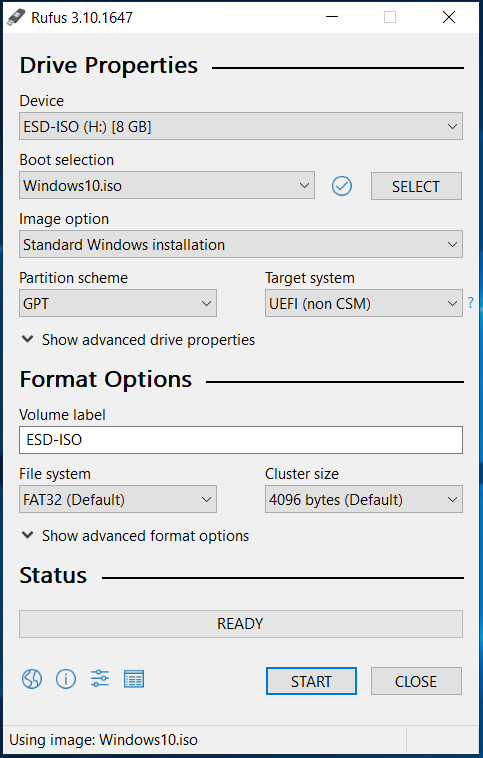

- RUFUS USB TOOL NOT VISIBLE HOW TO
- RUFUS USB TOOL NOT VISIBLE INSTALL
- RUFUS USB TOOL NOT VISIBLE FULL
- RUFUS USB TOOL NOT VISIBLE FREE
- RUFUS USB TOOL NOT VISIBLE WINDOWS
However, the user interface of RMPrepUSB looks cluttered, and it’s full of features. Well, RMPrepUSB is one of the most advanced USB Creation tools available out there, which you can use today. However, creating Bootable USB via PowerISO could be difficult because it doesn’t provide any direct option. The latest version of PowerISO is capable of creating a USB Bootable drive. It’s an image mounting tool that lets you mount disks. This one is not precisely a Bootable USB creator, but it can create Bootable USB.
RUFUS USB TOOL NOT VISIBLE FREE
Etcher is an open-source tool, and it’s entirely free to use. The user interface of Etcher is quite simple to use, and it supports all sorts of system images like DMG, ISO, IMG, etc.
RUFUS USB TOOL NOT VISIBLE WINDOWS
It’s a full-fledged bootable USB tool available for Windows and macOS. If you are searching for an easy-to-use tool to create bootable USB drives, then Etcher might be the best pick for you.

YUMI is supported on Windows 10, Windows 8.1, Windows XP, Windows 7, and Windows Vista.

Unlike all others, YUMI is not only limited to the creation of bootable USB drives it can even create bootable USB rescue disk and can be used for disk cloning as well. YUMI, also know as Your Universal Multiboot Installer, is another best tool to create Bootable USB drives.

Compared to all other USB Media creation tools, Universal USB Installer is pretty easy to use.
RUFUS USB TOOL NOT VISIBLE INSTALL
To create a Linux-based bootable USB drive with Universal USB Installer, pick a Live Linux distro, the ISO file, your flash drive, and click on the Install button. So the Rufus persistent storage feature should work with Pop!_OS 19.10 for instance, among others.Well, Universal USB Installer is primarily meant for Linux only, but it’s also compatible with Windows ISO files. The Rufus 3.7 release notes also mention that the new persistent storage feature may work with other Linux distributions too, " as long as they use a Debian-like or Ubuntu-like method, and, in the case of Ubuntu-like, if they use casper with the #1489855 bugfix". It's worth noting that this works not only with Ubuntu 19.10, but also Kubuntu, Lubuntu, Ubuntu MATE, Ubuntu Budgie, etc. The bug fix might land in Ubuntu 18.04 later on, so it will probably be included with the upcoming Ubuntu 18.04.4 release, expected on February 6th, 2020. Even though the Ubuntu 18.04.3 ISO was released after August 1st, 2019, it does not include this bug fix, so creating a persistent storage Live USB of Ubuntu 18.04.3 (or Linux Mint 19.*) using Rufus 3.7 and newer won't work. The reason for this is a bug that caused persistence on casper-rw partitions to break when the mount sequence order was changed, which was only recently fixed.įor now, this bug fix has only landed in Ubuntu 19.10 Eoan Ermine. BUT as far as Ubuntu is concerned, the persistence feature only works with ISOs of Ubuntu 19.10 Eoan Ermine and newer. The Rufus 3.7 release notes mention that with this release, the persistent partition support is finalized (so it's not longer experimental) for Debian and Ubuntu.
RUFUS USB TOOL NOT VISIBLE HOW TO
Related: How To Make a Bootable Windows 10 USB On Linux Using WoeUSB. But it doesn't support every Linux distribution out there. With the latest Rufus 3.7 beta though, the persistent partition feature works (I tested it with the latest daily build of Ubuntu 19.10 Eoan Ermine). This application is able to create persistent live drives that work in both UEFI (MBR or GPT) and BIOS mode, with casper-rw being used for the persistent storage partition, so it can have a size of more than 4GB.Įxperimental persistent partitions support was first added to this Windows bootable Live USB creation tool with version 3.6, but it didn't seem to work properly, as in my test, any changes made to the Live USB did not persist between reboots. It can be used to create not only bootable Windows drives from ISO files or disk images, but also create bootable Linux USB drives from Windows. Rufus is a popular free and open source graphical tool to create bootable USB drives from Windows. Starting with Rufus version 3.7, the application has finalized the persistent partition support for Debian and Ubuntu, allowing users to create persistent storage live USBs of recent Debian Live ISOs, and Ubuntu Live ISOs created after 1st of August, 2019.


 0 kommentar(er)
0 kommentar(er)
